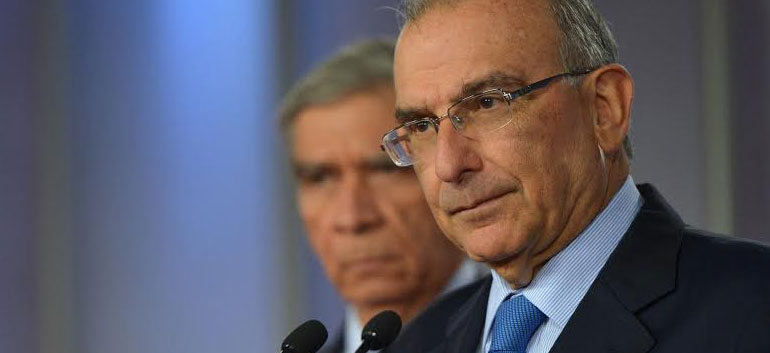While the FARC are willing to lay down, but not surrender their arms, the government’s chief negotiator assured that the rebels can not keep their weapons and urged the rebels to take full responsibility of crimes committed by guerrillas during the war.
Chief negotiator Humberto de la Calle, a former vice president, spoke to press at the end of the 30th round of talks that began in November 2012 and has so far resulted in preliminary agreements on rural reform, political participation and drug trafficking.
The FARC rebels and the government are currently talking with and about victims to decide what to do with the approximately 6 million civilian victims of the 50 years of violence between rebels and state. At the same time, military subcommittees are discussing the end of the conflict.
What about the guns?
In speeches held earlier this week, the FARC said that their idea of laying down weapons does not involve surrendering these weapons. Additionally, the FARC have said the army must also cease using weapons “to do politics.”
MORE: FARC Says Rebels Will Not Surrender Weapons In Event Of Peace
De la Calle has responded to these pronouncements by the rebels, reiterating they the group will indeed have to lay down its weapons, without using the contentious word “surrender” in his statement.
“The basic premise of this whole process is that once we sign a final agreement, the FARC will have to initiate the process of ceasing to have weapons in its power,” De la Calle said through a press release.
“Colombians can be sure that the FARC won’t keep their weapons if we arrive at an agreement. The laying down of arms is an imperative that must lead to a peace that is not armed,” the government peace negotiator added.
De la Calle also responded to the FARC statements that suggested that they would expect the State to lay down its weapons in “doing politics.”
“Government forces, by constitutional mandate, is instituted to protect the Colombian population and holds the legal monopoly on arms and the legitimate use of force. That is why it will not lay down its arms as a result of the transition,” the negotiator said.
The FARC and their victims
Also in De la Calle’s statement was a response to the FARC’s remarks over the weekend in which they denied involvement in war crimes or crimes against humanity.
MORE: FARC denies having committed war crimes against civilians
While he noted the importance of the guerrillas recognizing their civilian victims, he said that any remarks which note the asymmetry of the war or the “you too” excuse “should not be used by any actor to diminish the strength of recognition for responsibility for serious crimes.”
“As government delegation we have been emphatic in making clear we are willing to recognize all victims of serious ciolations of human rights and violations of International Law without discrimination,” said de la Calle.
The FARC has accepted responsibility for victimization in the conflict, and has recognized international humanitarian law over war crimes, but the group seems reluctant to recognize responsibility for the generation of millions of civilian victims during 50 years of violence.
“Pablo Catatumbo,” a senior military commander of the guerrilla group, has said that victims made by the guerrilla were never the target of the group’s actions and justified the military actions of the group as a legitimate means of rebellion against the state.
However, the FARC commander’s comments are highly controversial as the vast majority of victims of this conflict are civilians. More than 220,000 were killed in less than 60 years and millions have fled their home since the 1980s.
The FARC have consistently stressed the immense number of victims made by state-sponsored paramilitary violence between 1995 and 2006. Additionally –the rebels have pointed out– the military executed more than 4,000 civilians in the past 15 years. What the rebels want is the state and the United States be recognized as the conflict’s primary culprits.
MORE: Paramilitary killing spree was Colombia ‘state policy’: Court
However, the FARC itself has become infamous for financing its military operations with civilian kidnappings, which — if war law regarding citizens is applied — would constitute a war crime. A recent report said that almost half of the FARC’s fighters entered the group as a minor — another war crime.
Additionally, the group has been widely criticized over the use of landmines and using violent criminal activities such as drug trafficking and illegal mining to finance its goals.
Sources
- Email from Peace Commissioner’s office


